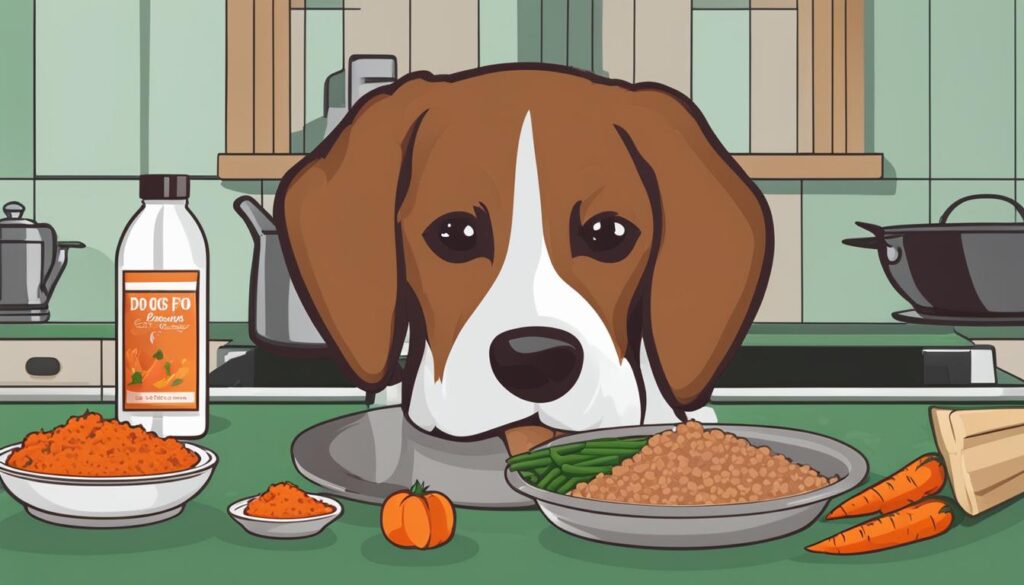If you’re a dog owner, you know that our furry friends are more than just pets. They’re members of our families, and we want nothing but the best for them. If your dog suffers from allergies, you understand the frustration of trying to find allergy-free dog food and treats that don’t compromise on taste or nutrition. Luckily, cooking for dogs with allergies can provide a simple and effective solution. In this section, we’ll explore the importance of cooking for dogs with allergies and offer solutions to meet your pup’s dietary needs.
Homemade dog food for allergies and hypoallergenic dog food recipes are an excellent option for dogs with food sensitivities. They allow you to carefully select the ingredients and avoid potential allergens commonly found in commercial dog food.
With homemade dog meals for allergies, you can ensure that your dog is receiving the right nutrients while keeping their allergies at bay. Also, allergy-friendly dog treats are an excellent alternative to store-bought treats that might trigger your dog’s allergies. Not to mention, they’re a fun way to bond with your furry friend in the kitchen.
Cooking for dogs with food sensitivities can be a rewarding experience for both you and your dog. In the following sections, we’ll dive deeper into understanding dog allergies, identifying allergens in commercial dog food, providing allergy-friendly recipes, treating allergies with special diets, and managing allergies with homemade treats. By the end of this article, you’ll have the knowledge to create an allergy-free diet plan for your pup.
Stay tuned for more information and tips on how to cook for your dog’s allergies!
Understanding Dog Allergies
As a dog owner, it’s crucial to understand the common allergies that affect our furry friends. Dogs can develop food sensitivities and environmental allergies just like humans, and these can cause discomfort and even harm to their health if left untreated.
Food Sensitivities: Dogs can develop food allergies or intolerances to certain ingredients in their diet. Common allergens include beef, chicken, dairy, and wheat. If your pup displays symptoms such as vomiting, diarrhea, or itching after eating, they may have a food sensitivity.
Environmental Allergies: Dogs can also suffer from allergies to environmental triggers such as pollen, dust mites, or mold. Symptoms include itchy or inflamed skin, chronic ear infections, and respiratory issues.
If you suspect that your dog has allergies, it’s essential to consult with your veterinarian. They can help identify the allergens, recommend an appropriate treatment plan, and advise you on dietary changes that may be necessary.
Dietary Considerations for Allergies
When cooking for dogs with food sensitivities, it’s important to avoid the ingredients that trigger their allergic reactions. This may involve switching to a specialized dog food that is free from common allergens such as beef and wheat or preparing homemade meals using hypoallergenic ingredients. You can also incorporate allergy-friendly treats into your dog’s diet that do not contain the allergens that affect them.
| Dog Allergy-Friendly Foods | Dog Allergy-Inducing Foods |
|---|---|
| Salmon and other fish | Chicken |
| Turkey | Beef |
| Quinoa | Corn |
| Brown rice | Wheat |
| Blueberries and strawberries | Dairy |
* Note: Always verify with your veterinarian before making any dietary changes for your dog.
By understanding your dog’s allergies and dietary considerations, you can create a meal plan that caters to their specific needs. Cooking for dogs with food sensitivities does not have to be complicated; simple substitutions and homemade options can ensure that your furry friend receives the nutrients they need while avoiding the foods that cause reactions.
Identifying Allergens in Commercial Dog Food
When looking for a solution to alleviate your dog’s allergies, it’s essential to understand the ingredients in their food. Many commercial dog foods contain potential allergens such as grains, animal by-products, and artificial additives. These ingredients may trigger allergic reactions in dogs, leading to discomfort and long-term health problems.
The best approach to identifying allergens in your dog’s food is to read the ingredient labels carefully. Common allergens, such as beef, chicken, dairy, and wheat, may appear under different names. For example, wheat may be listed as whole wheat, wheat flour, or wheat gluten.
| Common food allergens for dogs | Alternative ingredients to consider |
|---|---|
| Beef | Lamb, bison, venison |
| Chicken | Duck, turkey, rabbit, fish |
| Dairy | Unprocessed goat or sheep milk, lactose-free products |
| Wheat | Oatmeal, brown rice, barley |
While choosing commercial dog food, you should first look for hypoallergenic dog food options. Many brands have created hypoallergenic dog food recipes that don’t contain common allergens and can help manage allergic reactions in dogs. However, not every hypoallergenic food is perfect for every dog, so you should consult with a veterinarian to decide which food could be useful for your dog.
If you want to avoid potential allergens altogether, consider preparing homemade dog food for allergies. Creating food from scratch gives you complete control over the ingredients and ensures that your dog gets all their essential nutrients.


Allergy-Friendly Recipes for Dogs
Cooking for dogs with allergies doesn’t mean sacrificing taste or nutrition. In fact, preparing homemade dog food and treats can provide your furry friend with a range of health benefits while keeping their allergies in check. Here are some allergy-friendly recipes for dogs that are easy to make and delicious to eat:
Hypoallergenic Dog Food
For dogs with allergies, it’s essential to avoid common allergens, such as wheat, soy, and corn, and focus on hypoallergenic ingredients like lean meats, brown rice, and sweet potatoes. Try this simple hypoallergenic dog food recipe:
| Ingredients | Amount |
|---|---|
| Lean Ground Turkey | 1 lb |
| Brown Rice | 1 cup |
| Sweet Potato, cooked and mashed | 1 cup |
| Carrots, chopped | 1 cup |
| Peas | 1 cup |
| Spinach, chopped | 1 cup |
| Olive Oil | 1 tbsp |
| Water | 4 cups |
In a large pot, cook ground turkey over medium heat until browned. Add brown rice, sweet potato, carrots, peas, spinach, olive oil, and water. Bring to a boil, then reduce heat and cover. Simmer for 20-25 minutes or until the rice is cooked through and most of the liquid is absorbed. Allow to cool before serving.
Allergy-Friendly Dog Treats
Making your own dog treats is an excellent way to control the ingredients and avoid potential allergens. Try these simple and tasty allergy-friendly dog treats:
- Peanut Butter and Banana Bites – mix 1 mashed banana, 1 cup oat flour, and ½ cup peanut butter. Roll into balls and bake at 350°F for 12-15 minutes.
- Carrot and Apple Chews – slice 2 carrots and 1 apple into thin rounds and bake at 250°F for 2-3 hours or until crispy.
- Chicken and Sweet Potato Jerky – slice 1 sweet potato and 1 chicken breast into thin strips. Bake at 200°F for 2-3 hours or until chewy.


Experiment with different ingredients and recipes to find what works best for your dog. Cooking for dogs with allergies doesn’t have to be complicated or time-consuming; with a little creativity and effort, you can make delicious and nutritious meals that your furry friend will love.
Treating Allergies with Special Diets
If your dog is suffering from allergies, a special diet tailored to their specific needs could help alleviate their symptoms and improve their overall well-being. An allergy-free dog food diet is designed to eliminate allergens commonly found in commercial dog food, such as grain, beef, and chicken.
Before creating a canine allergy diet plan, consult with your veterinarian to ensure that your dog is not missing any vital nutrients. The diet should contain a balance of protein, fat, and carbohydrates, along with vitamins and minerals.
Hypoallergenic dog food recipes are an excellent option for dogs with food sensitivities. These recipes use alternative protein sources such as turkey, duck, or fish, rather than beef or chicken. These recipes also avoid grains, which can cause allergic reactions in some dogs.


When selecting an allergy-free dog food, check the ingredient labels carefully to ensure that the food doesn’t contain any allergens. Stick to a protein-based diet rather than relying on carbohydrates, and try to avoid fillers such as corn, wheat, and soy.
By taking a proactive approach to your dog’s allergies and creating a specialized diet plan, you can help your furry friend live a comfortable and healthy life free from the discomfort caused by allergens.
Managing Allergies with Homemade Treats
If you’re cooking for dogs with food sensitivities or allergies, don’t forget about their treats! Homemade dog treats can be an excellent addition to your furry friend’s diet, and you have full control over the ingredients. Here are some allergy-friendly dog treats that are easy to make at home:
- Peanut Butter and Pumpkin Bites: Combine 1/2 cup of pumpkin puree, 2 tablespoons of peanut butter, 1 egg, and 2 cups of almond flour. Roll the dough into balls and bake for 10-12 minutes at 350°F.
- Carrot and Apple Biscuits: Mix 1 1/2 cups of grated carrots, 1 1/2 cups of grated apples, 1 cup of oat flour, 1/2 cup of rolled oats, and 1 egg. Roll out the dough and cut into shapes, then bake for 25 minutes at 350°F.
- Sweet Potato Chews: Slice a sweet potato into thin strips and bake for 3 hours at 250°F, flipping occasionally. Allow the chews to cool before serving.
These homemade dog treats are free from common allergens like dairy, wheat, and soy, making them a great option for dogs with food sensitivities. However, it’s always best to consult with your veterinarian to ensure that these treats are suitable for your dog’s specific dietary needs.


Conclusion
Congratulations! You’ve now gained valuable insights into cooking for dogs with allergies. By understanding common dog allergies and identifying allergens in commercial dog food, you can provide your furry friend with allergen-free meals and treats. You also have a variety of allergy-friendly recipes to choose from and the knowledge to create a special diet tailored to your dog’s allergies.
Cooking for dogs with allergies can be a rewarding experience that enhances your dog’s quality of life. By keeping their allergies in check, you can ensure their overall well-being and happiness. So, start experimenting with homemade dog food and treats and show your furry friend how much you care!
FAQ
Why is cooking for dogs with allergies important?
Cooking for dogs with allergies is important because it allows you to have control over the ingredients in their food and treats. By preparing homemade dog food and treats, you can avoid potential allergens that may be present in commercial dog food products.
Are there any allergy-friendly recipes for dogs?
Yes, there are plenty of allergy-friendly recipes for dogs. You can find recipes that use alternative protein sources, such as turkey or salmon, and include hypoallergenic ingredients like sweet potatoes or carrots. These recipes are designed to be gentle on sensitive stomachs and help alleviate allergies.
Can I make my own hypoallergenic dog food?
Absolutely! Making your own hypoallergenic dog food is a great way to ensure that your dog is getting the right nutrients without any potential allergens. There are various recipes available that use ingredients such as hypoallergenic proteins (like rabbit or venison) and grains like quinoa or brown rice.
How can I identify allergens in commercial dog food?
To identify allergens in commercial dog food, you should carefully read the ingredient label. Look out for common allergens such as wheat, soy, corn, artificial colors, and preservatives. If your dog has known food sensitivities, consult with your veterinarian or a pet nutritionist to find commercial dog food options that meet their dietary needs.
What should I do if my dog has food sensitivities?
If your dog has food sensitivities, it’s best to consult with your veterinarian to determine the specific allergens. They can recommend a suitable diet plan and guide you in transitioning to hypoallergenic dog food or homemade meals that avoid the allergenic ingredients. Remember to introduce new foods gradually and observe your dog’s response.
Can I treat my dog’s allergies with homemade treats?
Yes, you can treat your dog’s allergies with homemade treats. By making your own treats, you have control over the ingredients and can avoid potential allergens. Look for simple recipes that use hypoallergenic ingredients like oats, pumpkin, or coconut flour. Always remember to introduce new treats gradually and monitor your dog for any adverse reactions.

